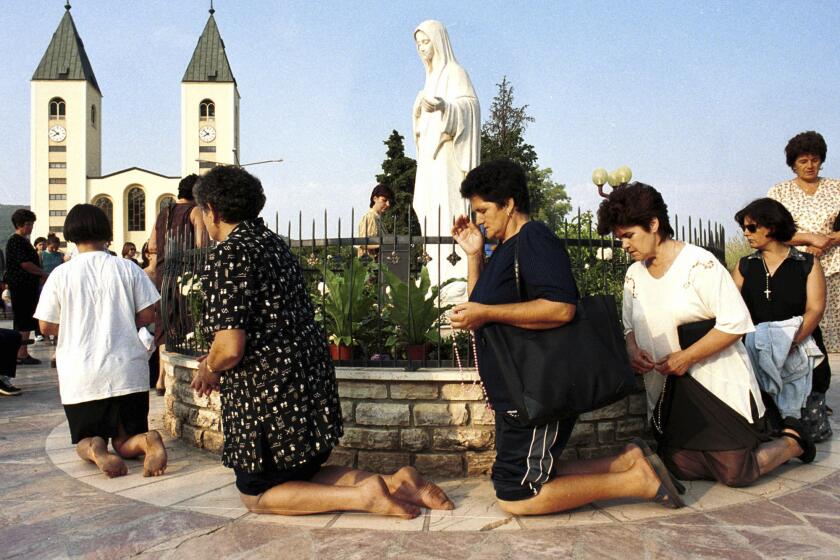A U.S. Move That Israel Should Welcome, Not Deplore
The American decision to talk directly to the Palestine Liberation Organization presents Israelis with a serious challenge, one that few seem able to take up--at least now. It is the task of reconciling themselves to the existence of an authentic Palestinian national movement with which they will have to compromise if they want to live in peace. This need not mean abandoning prudence and sacrificing their security. It need not mean a naive faith in the sincerity of Yasser Arafat’s muddled murmuring on behalf of coexistence.
Rather, it means a redefinition of Israeli security to recognize the diminished value of a narrow strip of territory in an age of missiles, high-speed jet fighters and sophisticated sensors. It means learning to use the international consensus instead of defying it. And it means broadening the concept of a security threat to include the effect that continued occupation of another people has on the health of a democracy.
In short, Israel’s interest lies in trying every way possible to get out of the West Bank and Gaza Strip, in exchange for concrete diplomatic gains and military guarantees. Israeli leaders should be welcoming, not deploring, Washington’s readiness to act as a trusted broker in that endeavor.
It is easy to understand Israel’s resistance, of course. The PLO’s assorted cells and movements have put bombs on Israeli buses, shot up schools, taken kibbutz children hostage and deprived Jews of the thorough sense of comfort and belonging that they have sought in the Jewish state. And some of the recalcitrant Palestinian groups, trying to embarrass Arafat, will probably continue to do so.
Moreover, the PLO has been a tool of the larger Arab world’s rejection of the Jewish state as an alien implant in the Middle East. Through all the recent maneuvering over Arafat’s lexicon of compromise, the root question persists: Do Arabs, including the PLO, still want Israel’s destruction? Most Israelis would undoubtedly answer yes .
To give the Palestinians the West Bank, even in confederation with Jordan, would be taking a risk. The West Bank does not lie across some sea or over a mountain or on the other side of a desert. It is literally just down the road, so close to Israeli population centers that Arab residents and Jewish settlers commute easily from the West Bank to work in Jerusalem and Tel Aviv.
Israelis are frightened by the fact that many Palestinians, like the Jews who embraced Zionism, have kept alive the dream of return, yearning to go back to their old lands inside Israel proper that they left during Israel’s 1948 war of independence. Those who embrace the ideology of return form an important constituency for Arafat.
Yet in the face of practical reality a momentous change has taken place among many Arab leaders in recent years--a resignation to the hard fact of Israel’s existence. This was reflected dramatically in the Palestine National Council’s endorsement last month, 41 years late, of the 1947 United Nations partition plan dividing Palestine into an Arab and a Jewish state, the plan accepted at the time by the forerunner of the Israeli government, the Jewish Agency.
Furthermore, continued occupation of the West Bank and Gaza is destroying Israel just as surely, albeit more gradually, as a successful military operation would. As Palestinians have demonstrated by their year-old “uprising,” the values that Israel holds high are extremely vulnerable. Fortunately, Israel has been a poor occupier. As an open democracy with a national conscience, it has not done well at subjecting 1.5 million Arabs to military rule. Large-scale arrests and army brutality have only made the hatred burn more fiercely.
The danger is that Israel will get good at being an occupier. If it does, it will no longer be the same Israel.
That is what worries a group of former Israeli generals who have organized to urge territorial compromise, arguing that military security can be maintained after a withdrawal.
In a withdrawal agreement guaranteed by the international community, the West Bank and Gaza would be demilitarized, as is Sinai under the Egyptian-Israeli peace treaty. Jordan would be barred from deploying tanks, artillery or other heavy weapons close to its border with the West Bank. Israel would retain hilltop sites on which electronic devices would be emplaced to monitor military movements.
But, before that, Israeli Jews and Palestinian Arabs have to recognize each other as legitimate national movements with authentic claims to part of that ancient land. This requires a deep psychological reversal, as an Israeli taxi driver illustrated when he got into an argument with a liberal Israeli passenger in Jerusalem about what should be done with Palestinian demonstrators. “We have to beat them and beat them and beat them,” he said, “until they stop hating us.”
More to Read
Start your day right
Sign up for Essential California for news, features and recommendations from the L.A. Times and beyond in your inbox six days a week.
You may occasionally receive promotional content from the Los Angeles Times.






